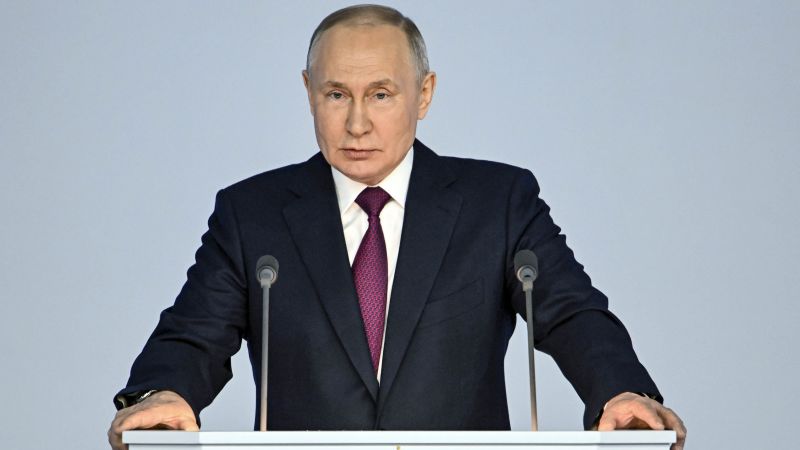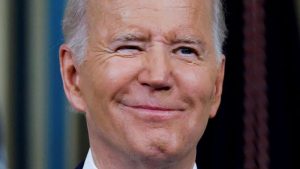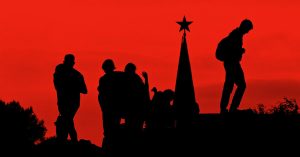
Putin says that Russia will no longer be in the nuclear treaty with the U.S
Moscow’s withdrawal from the nuclear arms pact and the fate of the nuclear saber rattling between the U.S. and Russia
Russia will suspend its participation in the New START treaty, according to Putin. The treaty took effect in 2011; it is set to end in February of 2026.
“We’re not in a nuclear arms race today,” Rusten said. “But it’s very concerning that we soon will be, because the bottom line is, this is the last nuclear treaty governing nuclear weapons of the United States and Russia that is in force. And obviously it’s under incredible strain now, and potentially unraveling. It’s set to expire in three years, and there’s no dialogue going on between the U.S. and Russia about what would come after that.”
The United States and Russia have been able to inspect each other’s weapons sites but have stopped because of the Covid-19 outbreak.
While Russia is not withdrawing from the pact completely, it appears to be formalizing its current position. US officials have been angry with Russia over its lack of co-operation with the agreement.
Mr. Blinken said that he would be willing to negotiate a new treaty that was clearly in the interests of the country as well as Russia.
“We’ll be watching carefully to see what Russia actually does, we’ll of course make sure that in any event that we are posturing appropriately for the security of our own country and that of our allies,” said Blinken. “I think it matters that we continue to act responsibly in this area … it’s also something the rest of the world expect of us.”
The Bilateral Consultative Commission on the treaty was supposed to meet in Egypt in late November but was called off before it even started. The US blamed Russia for this postponement and a State Department spokesman said the decision was made by Russia.
“If Russia halts data exchanges and notifications as required by the treaty in addition to on-site inspections and meetings of the BCC, it would make it much more difficult to verify Russia’s compliance with the treaty limits,” Bidgood said. “It would also eliminate important sources of transparency, predictability, and regular communication between Washington and Moscow, which are arguably more necessary now than ever.”
The US and its allies have been concerned by Putin’s nuclear saber rattling during the war, though they have dismissed the moves as empty threats.
“Nuclear powers do not lose major conflicts on which their fate depends,” Medvedev wrote in a Telegram post. Everyone should be aware of this. Even to a Western politician who has retained at least some trace of intelligence.”
He characterized Mr. Putins announcement as very unfortunate and irresponsible. He said the US would not change its compliance with the treaty regardless of what Russia did.
If that attitude holds, whoever is sitting in the Oval Office when the treaty expires in a bit more than 1,000 days may face a new world that will look, at first glance, similar to the one of a half-century ago, when arms races were in full swing and nations could field as many nuclear weapons as they wanted.
Vladimir Putin’s Day in Kiev: The Battle of the Neptune and Russia’s Spike on the Front Lines of Ukraine’s War
Putin also did not indicate how the fighting might end and did not specify Russia’s ultimate goals, beyond protecting the Russian-speaking population in eastern Ukraine from the “genocide” being perpetrated by the Ukrainian government.
He said he wasn’t about to allow inspectors to survey those facilities, because they could pass their findings on to the Ukrainians to launch further attacks. “This is a theater of the absurd,” he said. “We know that the West is directly involved in the attempts of the Kyiv regime to strike at the bases.”
Trust between the two countries is very low. Mr. Putin and Mr. Biden have not spoken directly in more than a year. The American president and the Russian leader have had differing opinions on the situation in Ukraine. Even if the American government negotiated a treaty, it would be hard for the Senate to approve it.
Putin delivered his remarks days ahead of the one-year anniversary of the Kremlin’s full-scale invasion of its neighbor. uniformed soldiers from the frontlines of Moscow’s special military operation in Ukraine were in the audience, the Kremlin said.
Missing from Putin’s address was any discussion of Russia’s significant setbacks on the battlefield and its evident failure in the early days of the war to occupy Kyiv and remove Ukraine’s democratically elected government.
Biden’s address follows his surprise visit to Ukraine’s capital Kyiv Monday — a move seen in Moscow as both provocative and proof that, in Ukraine, Russia is fundamentally fighting a proxy war with the United States.
Putin claimed that the West has a moral and spiritual collapse, which endangers the children of Russia. The head of the Russian Orthodox Church, Moscow Patriarch Kirill, was seated front-row center in the hall.
The Russian leader again equated Ukraine’s “neo Nazi” government with Nazi Germany, and said Russia was defending itself just as the Soviet Union defended its territory during World War II.
The cancellation of last year’s address was a result of bad news from the battlefield in Ukraine, but Putin’s speech in effect made up for it.
Russian lawmakers gather for an extraordinary session of both chambers of parliament on Wednesday, when Putin will speak at a mass rally in Moscow.
It was precisely a year ago that the Russian leader called for the formal recognition of two pro-Russian separatist republics in eastern Ukraine — pronouncing international diplomatic efforts to preserve Ukraine’s territorial integrity and find a diplomatic solution to a simmering conflict in the Donbas “futile.”
Putin then assembled his National Security Council for a televised session to discuss the independence issue — now famous for the image of the Russian leader holding court across a vast hallway to consult with, in theory, his closest advisors.
Nuclear Warfare and the New START Arms Control Treaty between the U.S. and Russia: What Do They Hope to Gain?
Gorbachev and Reagan declared in 1985 a nuclear war cannot be won and must never be fought.
“Nuclear arms control is something that needs to go on because it’s in the mutual interest,” Rusten said. “It’s been completely infected now by the broader geopolitical differences between the United States and Russia. It’s troubling.
New START allows each country to verify the weapons pact is being followed, by inspecting the other country’s nuclear arsenal multiple times each year. To avoid accidents or misunderstandings, the treaty requires regular communications about military equipment and operations.
Lynn Rusten, vice president of the Global Nuclear Policy Program at the Nuclear Threat Initiative in Washington, D.C., and Sarah Bidgood, director, answered questions about what Putin and Russia hope to gain by this move.
Russia said it would inform the U.S. of any missile launches, but didn’t say whether it would continue sending notifications about the movement of strategic military assets.
Whenever a strategic item that is subject to the treaty moves, you send a notification. “So those are really important and they’ve been going on seamlessly throughout,” even in the absence of inspections.
“I think it’s more tied to the fact that the United States, two weeks ago, formally called out Russia as being in violation of the treaty,” Rusten said. The legal explanation for why the Russians won’t host on-site checks is being put forward by the Russians. To be honest, I don’t think it had anything to do with Biden’s visit.
“‘suspension’ is a term of art which means it has a particular legal meaning,” Rusten said. “When one party isn’t complying with a treaty, it’s one of the options available to the aggrieved party. For arms control treaties, that should be used only if the U.S. is violating New START.
“Russia is linking it more broadly to our support of Ukraine. I don’t think the U.S. State Department lawyers would say that’s a legitimate use of that sort of right under international law.”
The Russian leadership no longer believes that arms control with the US should be kept out of the larger events of bilateral relations, as it was during some of the most difficult times of the Cold War.
“Not of which I am aware,” Bidgood said. “What I think is important to note, though, is that — as Andrey Baklitskiy of [the United Nations Institute for Disarmament Research] points out — suspending participation is a political decision that can be reversed. What we don’t know is, under what circumstances would or could that happen?
Source: https://www.npr.org/2023/02/22/1158529106/nuclear-treaty-new-start-putin
Does it matter if a nuclear war is won and it isn’t won, and if it cannot be won, then what does the U.K. do?
“I think its significance really depends on how states behave,” Bidgood said. “If you affirm, as Putin has, that a nuclear war cannot be won and must never be fought, but then also engage in nuclear saber-rattling, then it seems to me that these words ring pretty hollow.”
For the first time the leaders of the US, Russia, China, France and the U.K. made that statement together in writing, Rusten said.
“That’s really significant,” she added. “And that should be a platform on which to build, and step back from this brink that we have walked up to and that Putin’s walking up to, and take meaningful steps to make sure that a nuclear war isn’t fought, because it can’t be won. And it can’t even advance Putin’s war aims in Ukraine, or globally.”
The nonproliferation and disarmament regime is an important part of it. There is a clause in the treaty that obligates all states’ parties to pursue negotiations in good faith on effective measures relating to cessation of the nuclear arms race at an early date and to nuclear disarmament.
“It creates a mandate to engage in negotiations,” Bidgood said, “which is really important in this environment. But what we need are the outcomes of those negotiations.”

